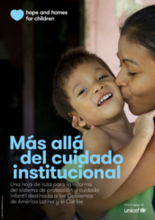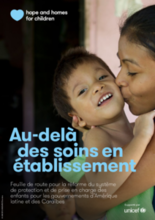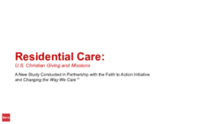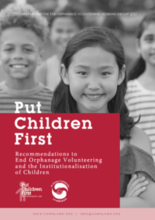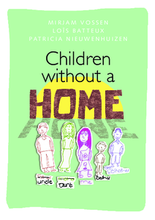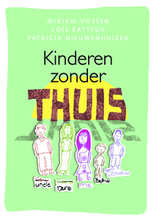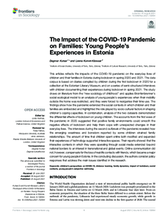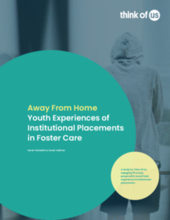Displaying 101 - 110 of 713
Más Allá del Cuidado Institucional proporciona un marco para que los gobiernos desarrollen su propia hoja de ruta para la reforma de sus sistemas de protección y cuidado infantil y la desinstitucionalización. Esperamos que esto inspire el diálogo, guíe las conversaciones entre grupos interministeriales y en la sociedad, oriente a grupos
multidisciplinarios de todos los niveles en la creación de su propia evaluación y ayude en la planificación de su propia hoja de ruta para el cambio.
Au-delà des soins institutionnels fournit un cadre aux gouvernements pour développer leur propre feuille de route pour la réforme et la désinstitutionnalisation du système de protection et de garde des enfants. Nous espérons qu'il inspirera une conversation, guidera le dialogue interministériel et interprofessionnel, soutiendra les groupes multidisciplinaires à tous les niveaux pour encadrer leur propre évaluation et planifier leur propre feuille de route pour le changement.
This report contains the findings from a nationally representative study conducted by Barna Group of U.S. Christians to better understand U.S. Christian beliefs around and support for orphanages, children’s homes and other forms of residential care for children. It includes data on the amount of funding given to residential care, as well as visits and short-term missions to orphanages.
Research has shown the harm of orphanage care on children’s health, development and wellbeing and how orphanage volunteering is working to perpetuate these institutional systems which separate children from their families and communities. There is now a global movement to end both practices. These key policy recommendations were published as part of the "Put Children First: End Orphanage Care" campaign.
Millions of children in developing countries are unable to live at home for a variety of reasons. The fate of these children is a concern for many people. Some start projects, volunteer with children or support an orphanage. This guide is for them. It is also important for organisations that do not specifically focus on vulnerable children. Because children without sufficient paren-tal care are everywhere: in schools, villages and poor areas in big cities.
Miljoenen kinderen in ontwikkelingslanden kunnen tijdelijk of langdurig niet thuis wonen. Soms omdat hun ouders zijn overleden of omdat de problemen thuis te groot zijn. Soms omdat ze zijn weggelopen of van hun familie gescheiden door oorlogen, rampen of kinderhandelaren. Het lot van deze kwetsbare kinderen gaat veel mensen aan het hart. Ze starten een project, doen vrijwilligerswerk met kinderen of ondersteunen een weeshuis.
Voor hen is Kinderen zonder ‘thuis’ bedoeld.
These presentations from Know-How Center Bulgaria, Children and Family Initiative, and Changing the Way We Care, were delivered during the September 30, 2021, workshop of the Care Measurement Task Force of the Transforming Children's Care Global Collaborative Platform. The focus of the workshop was translating research evidence into action.
This articles reflects the impacts of the COVID-19 pandemic on the everyday lives of children and their families in Estonia during lockdown in spring 2020 and 2021. The data corpus is based on diaries compiled by children during the first lockdown in 2020 for a collection at the Estonian Literary Museum, and on a series of semi-structured interviews with children documenting their experiences during lockdown in spring 2021. The study draws on literature from the “new sociology of childhood” and applies Bronfenbrenner’s social ecological model to an analysis of young people’s experiences when their mobility outside the home was restricted, and they were forced to reorganise their time use.
This study provides a deep, nuanced understanding of the lived experience and mental models of young people who have recently lived in institutional placements while in foster care. It offers an understanding of institutional placements from youths’ perspectives.

